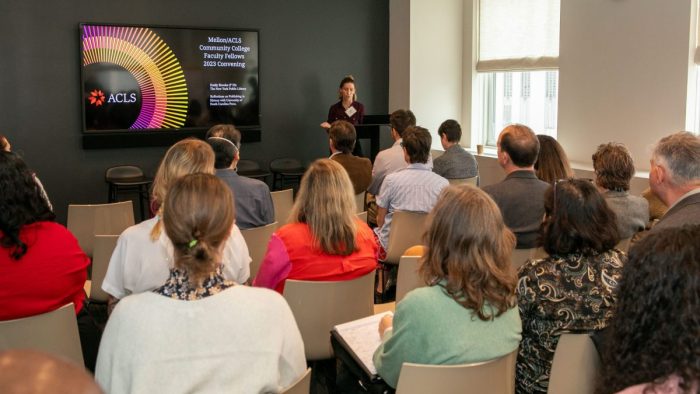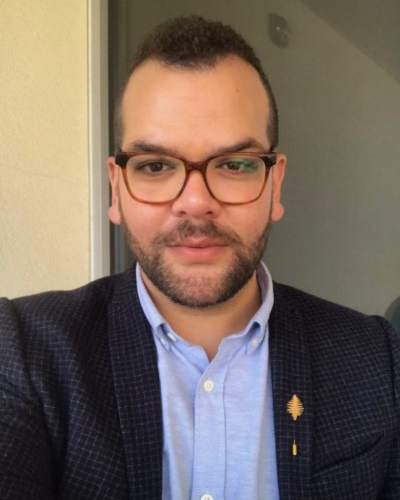


Access and equity in higher education is something that I’ve always been passionate about, and I can think of no better model for this than the community college sector. Community colleges were my first introduction to the US system of higher education: it is where my older siblings took ESL courses when we first moved to the United States from the Dominican Republic and where they went on to earn degrees that have set them up for successful careers. When I joined ACLS in 2022, I was eager to contribute to the ongoing work supporting the community college sector, to reach more scholars, and to help increase diversity within the academy.
My first major undertaking as a Program Officer at ACLS challenged me to do just that: a convening of nearly 100 recent ACLS fellows from the community college sector for a multi-day conference in New York City to connect with and learn from each other. Community colleges reach the largest number and most diverse population of students—many first generation, non-native English speakers, and low-income students—in all of higher education, and their faculty make vital contributions to their local communities, to their students, and to the larger enterprise of the humanities as a public good.
Now, almost exactly a year later, as we look back at those three days of presentations, plenaries with learned society leaders, and extensive dialogue with our fellows, I cannot overstate how instrumental that convening has been in shaping our current work with community college faculty. It has also bolstered our aspirations to support scholars working in this historically underserved higher education sector and amplify the many contributions community college faculty make to innovative approaches to research, pedagogical practices that center student experience, and equitable community-engaged work.
Last month, with support from the Mellon Foundation, we launched the ACLS Community College Faculty Research Fellowships, a one-year pilot program for community college scholars in the humanities and social sciences that funds two-to-three month virtual, hybrid, or on-site research residencies at one of three partnering humanities research centers: the American Antiquarian Society, the Folger Shakespeare Library, and the Newberry Library. The structure of the program was designed with the feedback from our community college fellows who voiced the need for more flexible and shorter-term opportunities that can be more easily accommodated alongside high teaching and service responsibilities.
This new program is part of a wider effort by ACLS to offer a fuller range of funding opportunities—from short-term research residencies to longer-term fellowships—for faculty in teaching-intensive roles, allowing them to more fluidly integrate their research ambitions into their professional responsibilities. As we look to further strengthen our commitment to an increasing number of scholars in such positions, the ACLS Community College Faculty Research Fellowships will also bring fellows together for listening sessions where they can advise us, our program partners, and other members of ACLS networks on enhancing access to the resources they need to pursue their scholarship.
Listening to the needs of the scholars doing the work and considering the larger contexts in which this work takes place has been central to the development of programs at ACLS. It has served as the foundation for the ACLS Community College Humanities Initiative, which seeks to advance the humanities in the community college sector through a range of convenings, fellowship and grant programs, and collaborative research initiatives. Among the first of these collaborative initiatives is an exploration of the institutional landscapes for research, service, and teaching at a range of two-year colleges. We have brought together 12 recent ACLS awardees from community colleges across the country to discuss system-wide issues in the humanities and social sciences and offer positive models for the powerful ways that scholarship and teaching are practiced in these schools. With guidance from two leaders in the sector who are serving as editors, participants are authoring reflection pieces touching on four themes: research landscapes; student engagement and pedagogy; community engagement and public facing work; and equitable practices.
Several contributors met just last week at the annual meeting of the Community College Humanities Association in Knoxville, TN. There, they shared preliminary findings on models of research and curricular innovation in the humanities at community colleges with our team, as well as leaders from the American Historical Association, American Philosophical Association, and the Modern Language Association.
The often-reified walls between the scholar, the classroom, and the community are thin at community colleges, and that is something to celebrate and model across other sectors of higher education. I am excited to circulate and amplify the work being done by this impressive group, whose reflections as scholars, teachers, and community advocates and activists will have incredible resonance within and beyond the community college sector.
Nike Nivar Ortiz
Program Officer